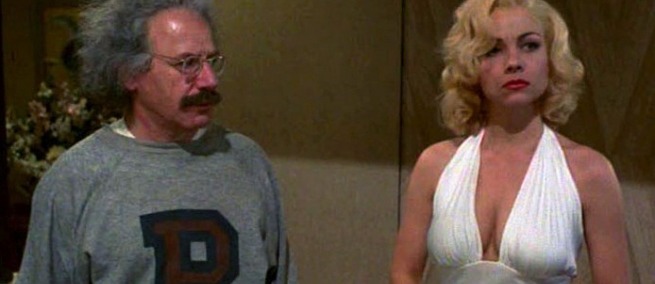
Did Albert Einstein and Marilyn Monroe ever have an affair? In 1985, Nicolas Roeg made a film which imagined such a scene. On August 9, 2016, Chief Curator David Schwartz and Science & Film’s Executive Editor Sonia Epstein spoke together about Albert Einstein’s relationship to Hollywood. They discussed representations of Einstein in film, including in Roeg’s film, as well as Einstein’s visits to Hollywood and his friendship with Charlie Chaplin. The entire conversation is available to stream below:
Surprisingly, as he was the greatest mind of the twentieth century (and his Facebook page has 19 million followers signaling the public’s continued interest in him), there are slim pickings when it comes to representations of Albert Einstein in film. Of those, Michael Emil’s portrayal in Nicolas Roeg’s 1985 feature INSIGNIFICANCE shows him as a more multi-dimensional human being. He is intensely invested in work on his calculations, but cannot help succumbing to the charm of Marilyn Monroe (played by Theresa Russell) when she insists on spending the night in his hotel room. In real life, Einstein, though a theoretician, was a visual thinker who concocted scenarios to think through his theories; he imagined an object chasing a beam of light and time passing for twins one on earth and one in space. In an 8-minute clip from INSIGNIFICANCE, Monroe sets up a physical demonstration similar to one of Einstein’s thought experiments to prove to him that she understands his special theory of relativity:
In the 1994 film I.Q., Walter Matthau is Albert Einstein. His main role is as grandfather to his brilliant granddaughter Meg Ryan; he spends the movie scheming to get her together with a car mechanic.
Christopher Lloyd’s Doc Brown, in Robert Zemeckis’s 1985 BACK TO THE FUTURE, is the quintessential mad scientist–he can barely pause to explain his ideas. He has Einstein’s wild white hair and a dog named Einstein. While it is hard to follow Doc Brown’s explanations, physicist Michio Kaku has said that the film does get the basic theories about time travel correct.
In the 2001 Steven Spielberg film A.I., the robot boy played by Haley Joel Osment questions a holographic projection with the same white hair and accent as Einstein, named Dr. Know. As the name implies, this game can answer any question.
Gene Roddenberry’s cult STAR TREK: THE NEXT GENERATION boasts a holographic projection of Einstein who is summoned to work out the Grand Unified Theory with Lieutenant Barclay. He is a teaching program which can be turned on and off at the Lieutenant’s whim.
The BBC and HBO production EINSTEIN AND EDDINGTON, from 2008, is a period piece which focuses on a specific moment in Einstein’s life. This is a more straightforward, character-driven drama.
As to why there haven’t been more films made about Einstein: perhaps it is because he was a theoretician and so his science is not easy to dramatize visually; perhaps it is because his troubled personal life is contrary to the genial picture of him (sticking his tongue out); perhaps it is because of the paradoxical fact that he was a pacifist but also urged the founding of the Manhattan Project; perhaps it is because he already looms so large in popular culture that no one has tried yet to look beneath the surface. As chief curator David Schwartz said in the interview, there is a remaining question of “how do you make a movie that’s as exciting and dramatic as the real life story? I don’t think [filmmakers have] figured out how to dramatize it.” Two students, funded by the Sloan Foundation, have written scripts about Einstein’s first wife Mileva, who was also a mathematician and physicist. A documentary about the avant-garde opera EINSTEIN ON THE BEACH is in the making.
FILMMAKERS
PARTNERS
TOPICS